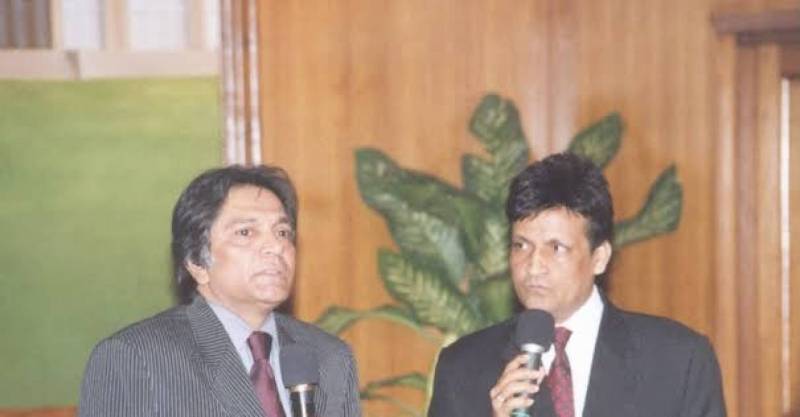
When it comes to having a funny bone, Pakistan has been replete with talent. It does not matter the language, the stage, or the situation; some of these funny folk have found ways to make us smile. No wonder that late-night television in Pakistan is dominated by such talent.
But one individual stands head and shoulder above all others and is deemed a comic genius. That individual was the late Umer Sharif.
While he left us two years ago to the day, Sharif transformed comedy for the masses, whether it was on stage, in stand-ups, on television or even the odd film.
He gained transcendent fame and accolades through his witty dialogue, impeccable dialogue delivery, timing, spontaneous jokes and the ability to perfectly mimic, which cemented him as the most prominent comic artist of the subcontinent.
Born into a family of first-generation migrants from India after the Partition, Sharif was strongly rooted in several Indian traditions and customs. He often used this to endear himself to crowds from across the border where he was equally loved.
His birth name was Mohammed Umer Zarif. But the comedian changed his name to 'Umer Sharif' after being enthralled by a performance of the legendary Egyptian actor Omar Sharif in the Hollywood classic "Lawrence of Arabia".
His introduction into the world of show-biz was as a tender, 14-year-old instrumentalist and writer in 1969. But when he found himself on stage, his performances showed him another path.
Despite his age, his wit was quite sharp. Combined with his ability to deliver jokes with a completely straight face, it instantly won him fans and success.
Sharif was among the few who were equally adept at stand-up performances as he was at acting in comedy shows on stage. This helped open the doors for new kinds of audiences. Soon, he was among the most sought-after hosts for major events, adding his unique touch of humour to make it more enjoyable and memorable for the crowd.
In 1976, Umer wrote one of his first stage plays, 'Bionic Servant'. It was based on the American television series "Six Million Dollar Man" starring Lee Majors. Moin Akhtar was one of the actors cast in the play, and it launched their longstanding friendship.
Although Sharif played some roles on television, including in the famed comedy show Fifty-Fifty for some time, the producers at Pakistan Television (PTV) started brushing him aside, citing Sharif's inability to stick to a script and his predilection for what they deemed was ‘crass’ street humour, which was unfit for the state broadcaster.
His career took off in 1989 when he premiered his masterpiece, "Bakra Qiston Pay" (Goat on installments), a comedy stage play which became immensely popular and earned him enduring fame across the subcontinent.
He never looked back since. Over the next three decades, he cemented himself as Pakistan's uncrowned comedy king. Such was the popularity of his stage plays and stand-up shows, they were recorded onto double-sided audio cassettes and played repeatedly in buses and wagons. It proved that the quality of his jokes had an equal appeal across social divides.
His long career in the entertainment industry meant he worked with some of the greats of the time, including the legendary Moin Akhter, apart from comedians such as Rangeela, Ismail Tara, Nirala, actors Javed Sheikh, Waseem Abbas, Zeba Shehnaz, and Bushra Ansari among many others.
Sharif also tried his luck in Pakistan's stumbling film industry, where he also found success.
His 1992 directorial Mr. 420. He also wrote, acted in and directed other movies, including Mr Charlie, Chand Suraj, and Miss Fitna, which all did well at the box office.
By the time he entered the twilight of his career, he had performed in over 300 stage plays and over 100 movies. He hosted several television shows and innumerable award shows.
His influence spread across the border into India as well, where he inspired many comedians who rose to fame, such as Kapil Sharma, Raju Shrivastav, Sunil Pal, Rajiv Thakur and Sudesh Lahiri who all admitted that at one point or the other, they had used one-liners and jokes from the iconic comedian.
In the 90s, when renting VHS cassettes became a common practice, Sharif capitalised by releasing recordings of his stage play on VHS tapes.
That was a major breakthrough and granted him access to the masses, which he always played for. Some of his tapes even made it across the border, as was the norm in those days, where he earned exemplary fame.
Sharif was awarded the Tamgha-i-Imtiaz for his services to the Pakistani entertainment industry.
Having suffered through health complications throughout the 2010s, his health rapidly deteriorated after the death of his daughter Hina in February 2020, leaving him utterly shattered.
He became bedridden and had to be flown to Germany in an air ambulance, where he died on October 2.
He will always be remembered as a pioneer of modern comedy in the subcontinent.

